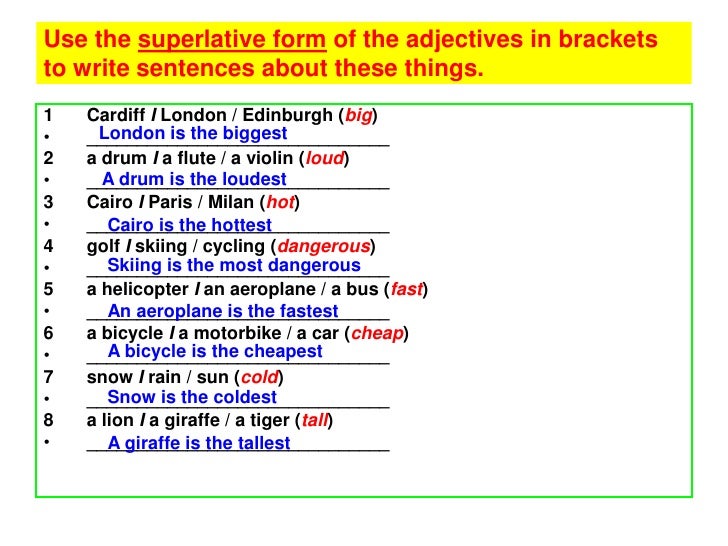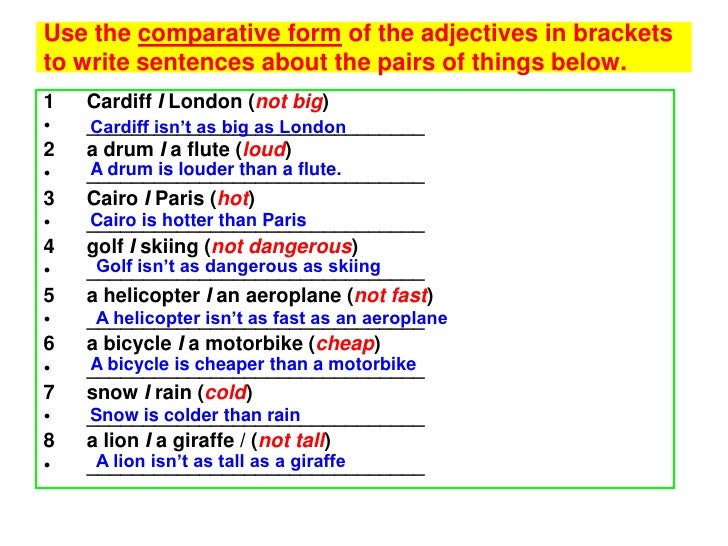Do you want to find 'how to write comparative sentences in spanish'? You will find questions and answers on the subject here.
Usance the rule más/menos + adjective + que to comparison two things. ...Use más/menos + adverb + que to describe differences stylish how something is done. ...Use más/menos + noun + que to comparability nouns or how many “things” mortal has. ...Use Diamond State if you’re comparison numbers.
Table of contents
- How to write comparative sentences in spanish in 2021
- Comparative sentences in spanish examples
- Spanish superlatives
- Spanish comparison examples
- As many in spanish comparative
- Comparisons of equality spanish examples
- Comparative adjectives spanish
- Comparatives and superlatives spanish quizlet
How to write comparative sentences in spanish in 2021
 This image representes how to write comparative sentences in spanish.
This image representes how to write comparative sentences in spanish.
Comparative sentences in spanish examples
 This image demonstrates Comparative sentences in spanish examples.
This image demonstrates Comparative sentences in spanish examples.
Spanish superlatives
 This picture shows Spanish superlatives.
This picture shows Spanish superlatives.
Spanish comparison examples
 This picture shows Spanish comparison examples.
This picture shows Spanish comparison examples.
As many in spanish comparative
 This image illustrates As many in spanish comparative.
This image illustrates As many in spanish comparative.
Comparisons of equality spanish examples
 This picture shows Comparisons of equality spanish examples.
This picture shows Comparisons of equality spanish examples.
Comparative adjectives spanish
 This picture shows Comparative adjectives spanish.
This picture shows Comparative adjectives spanish.
Comparatives and superlatives spanish quizlet
 This picture representes Comparatives and superlatives spanish quizlet.
This picture representes Comparatives and superlatives spanish quizlet.
Which is an example of a Spanish sentence?
Examples of sentences using superlatives in Spanish. Fernando es el más alto de la clase. Fernando is the highest in the class. Alejandra es la más joven del grupo. Alejandra is the youngest of the group. China es el país más poblado del mundo. China is the most populous country in the world. Thiago es el bebé más hermoso del mundo.
Which is an example of a comparative superlative adjective?
The relative superlative describes a person or thing who possesses a certain quality to a greater or lesser degree than another. Its formed using the definite article + más/menos + adjective. The adjective ending agrees in number and gender with the noun it describes. Clara es la más rápida.
How to use a comparative adjective in Spanish?
This great post goes into all of the nitty-gritty details of making comparisons in Spanish, but here’s a quick overview: Forming a comparative adjective in Spanish is very easy. Simply add the word más before a regular adjective! Feliz means “happy” and so más feliz means “happier.” Simple as that. El sol es más grande que la luna.
How to use superlatives in a Spanish sentence?
Here are some of the most important rules for superlatives in Spanish: We have to find a definite article (el, la, los, las) that agrees in number and gender with the main noun in the sentence, e.g. “Paco es el más inteligente” (Paco is the most intelligent) In Spanish, the word “MÁS” means both MORE and MOST.
Last Update: Oct 2021